As a holistic veterinarian, I understand how much you love your Belgian Tervuren. These dogs are not only beautiful, but also intelligent and loyal companions. But, like any breed, they have their specific health challenges. One of the areas that often gets overlooked is Belgian Tervuren eye health.
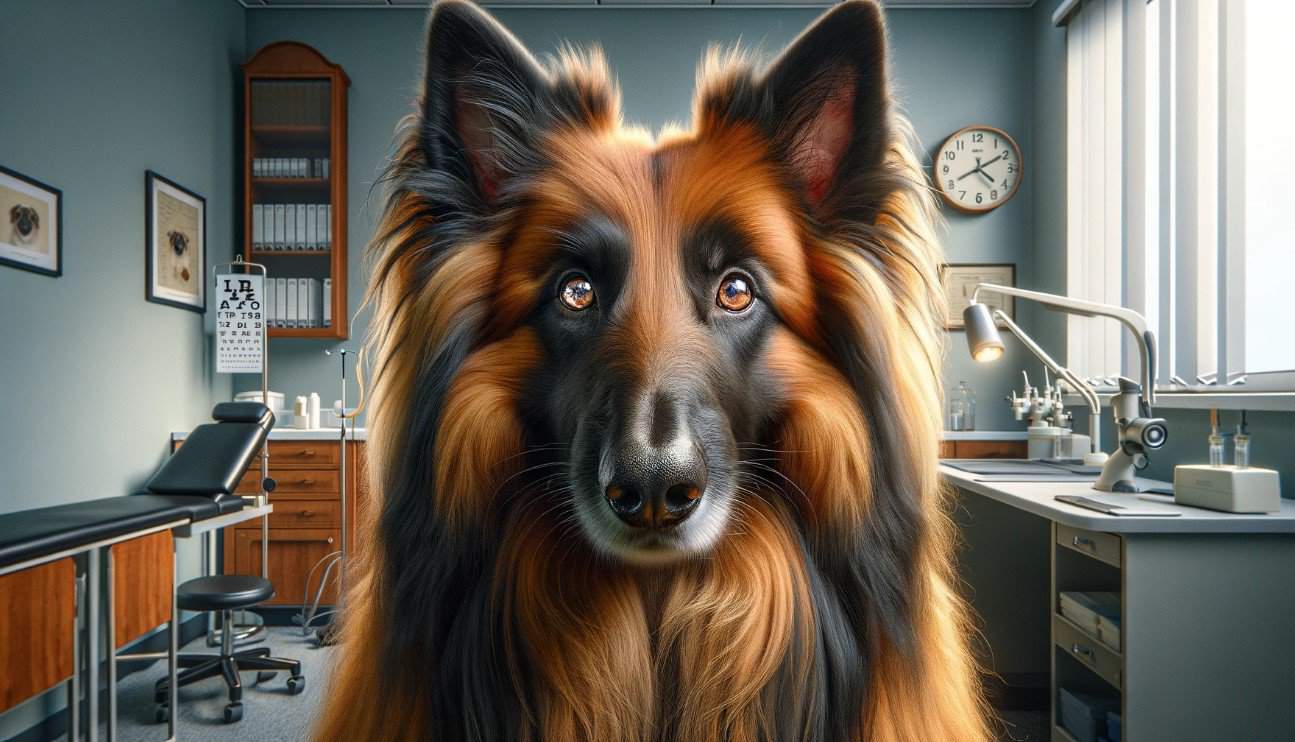
Belgian Tervuren dogs are prone to certain eye conditions that can affect their quality of life. But don’t worry, I’m here to help you understand these issues and guide you on how to prevent them. We’ll discuss the unique structure of their eyes, common eye diseases, and the holistic solutions that can keep your dog’s eyes healthy.
From diet and supplements to environmental hygiene and routine care, there’s a lot you can do to maintain your furry friend’s eye health. So, let’s get started on this journey to ensure your Belgian Tervuren’s eyes are as bright and healthy as they can be. Remember, prevention is always better than cure, especially when it comes to eye health in Belgian Tervuren dogs.
Whether you’re a new Belgian Tervuren parent or a seasoned one, this guide is for you. Let’s make those beautiful eyes sparkle!
Understanding Breed Specific Eye Structure
As a dedicated Belgian Tervuren parent, you understand that your dog’s health is a top priority. One area that requires special attention is your Tervuren’s eyes. Understanding the unique eye structure of this breed can help you better care for your furry friend and ensure their eyes remain healthy throughout their life.
The Belgian Tervuren, like all dogs, has eyes that are spherical in shape. However, the Tervuren’s eyes are somewhat almond-shaped, giving them their unique, expressive look. They have a clear cornea at the front, which helps to focus light into the eye. Behind this is the iris, which controls the amount of light entering the eye, and the pupil, the hole through which the light enters.
Inside the eye is the lens, which further focuses the light onto the retina at the back of the eye. The retina contains cells called photoreceptors, which convert the light into electrical signals. These signals are then sent to the brain via the optic nerve, allowing your Tervuren to see.
Your Belgian Tervuren’s eyes also have a third eyelid, or nictitating membrane. This is a thin layer of tissue that helps to protect the eye and keep it moist. Some Tervurens may have visible third eyelids, while others may not.
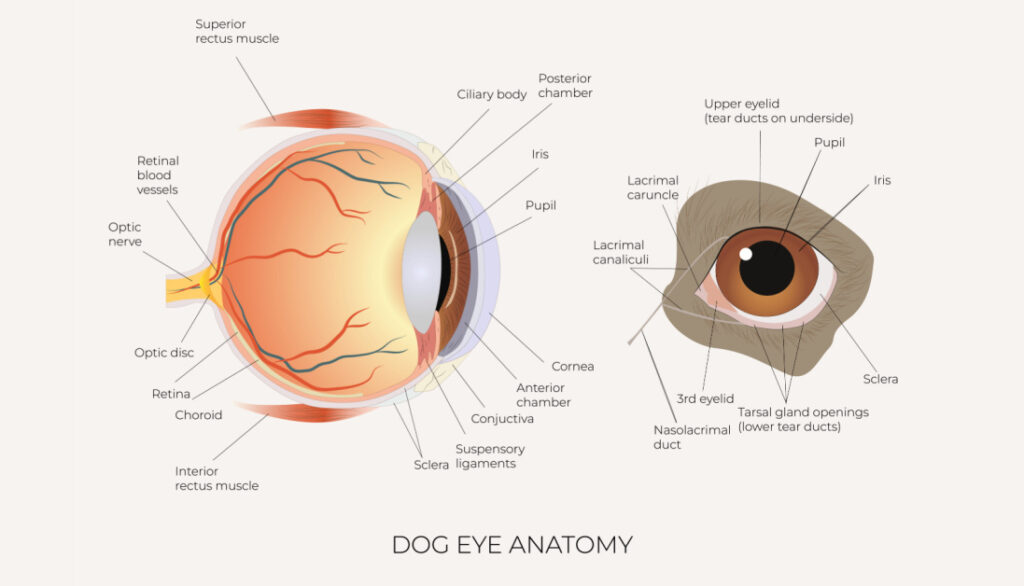
One unique aspect of the Belgian Tervuren’s eye structure is their relatively large tear glands. These glands produce tears to keep the eyes lubricated and help flush out any debris. However, they can also be prone to certain health issues, which we’ll discuss in the next section.
Knowing the structure of your Belgian Tervuren’s eyes is the first step towards maintaining their eye health. By understanding how their eyes work, you can better spot potential problems and seek veterinary care when necessary. Remember, the eyes are the windows to your dog’s soul – and their health. So, let’s ensure we keep them bright, clear, and healthy!
Common Eye Issues In Belgian Tervuren
As a veterinarian, I’ve seen a variety of eye issues in Belgian Tervuren dogs. These intelligent, energetic canines are generally healthy, but they are prone to certain eye problems. It’s important to understand and recognize the signs of these conditions to maintain your dog’s Belgian Tervuren eye health.
The most common eye problem in Belgian Tervuren is Progressive Retinal Atrophy (PRA). This is a group of genetic diseases that cause the retina to deteriorate over time, leading to blindness. Symptoms include night blindness and a gradual loss of daytime vision. Unfortunately, there is no cure for PRA, but early detection can help manage the condition and slow its progression.
Cataracts, another common issue, are cloudy or opaque areas in the eye’s lens that can impair vision. Belgian Tervuren may develop cataracts as they age or due to diabetes. Prompt treatment, often involving surgery, can restore vision.
Glaucoma is a serious condition that can lead to blindness if left untreated. It occurs when there’s an increase in pressure within the eye, damaging the optic nerve. Symptoms include redness, pain, and a cloudy cornea. Immediate veterinary attention is essential to prevent permanent vision loss.
Another condition to be aware of is Entropion, where the eyelid rolls inward, causing the lashes to rub against the cornea. This can lead to discomfort, corneal ulcers, and potentially, vision loss. Surgery is usually required to correct the problem.
- Progressive Retinal Atrophy (PRA): Genetic disease causing retina deterioration.
- Cataracts: Cloudy or opaque areas in the eye’s lens.
- Glaucoma: Increased pressure within the eye, damaging the optic nerve.
- Entropion: Eyelid rolls inward, causing lashes to rub against the cornea.
Regular eye check-ups can help detect these conditions early, improving the chances of successful treatment and preserving your Belgian Tervuren’s eye health. Remember, prevention is better than cure. As a responsible Belgian Tervuren parent, always be vigilant about your dog’s eye health and seek veterinary care at the first sign of trouble.
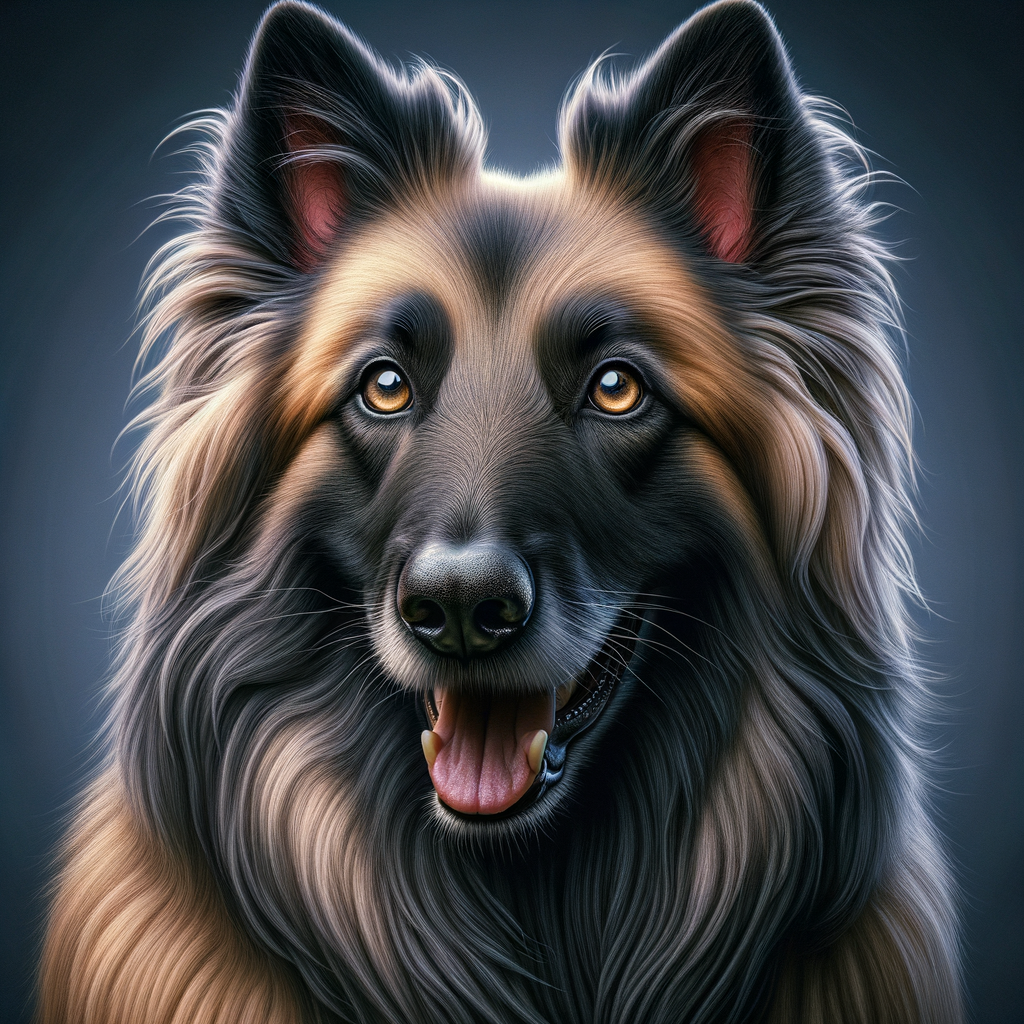
Prevention of Eye Problems
Ensuring your Belgian Tervuren gets the right nutrients for optimal eye health is essential for maintaining clear vision and preventing age-related issues. Natural, nutrient-rich foods and supplements can play a key role in supporting their eyesight. From vitamin A-packed freeze-dried liver treats to antioxidant-rich blueberries and targeted supplements like Eyeplex by Standard Process, there are several ways to nourish your dog’s eyes. In this section, we’ll explore how these powerful ingredients contribute to long-term vision health and overall well-being.
Eyeplex by Standard Process
Eyeplex by Standard Process is a specialized supplement designed to support your Belgian Tervuren’s eye health with a blend of essential nutrients. Formulated with key vitamins, minerals, and antioxidants, Eyeplex helps protect against oxidative stress, supports retinal function, and promotes overall vision health. Ingredients like vitamin A, vitamin C, and zinc contribute to maintaining strong eyesight, while whole food ingredients provide additional phytonutrients for cellular protection. Adding Eyeplex to your Belgian Tervuren’s diet can be especially beneficial for aging dogs or breeds prone to eye conditions, offering targeted nutritional support to keep their vision sharp and healthy for years to come.
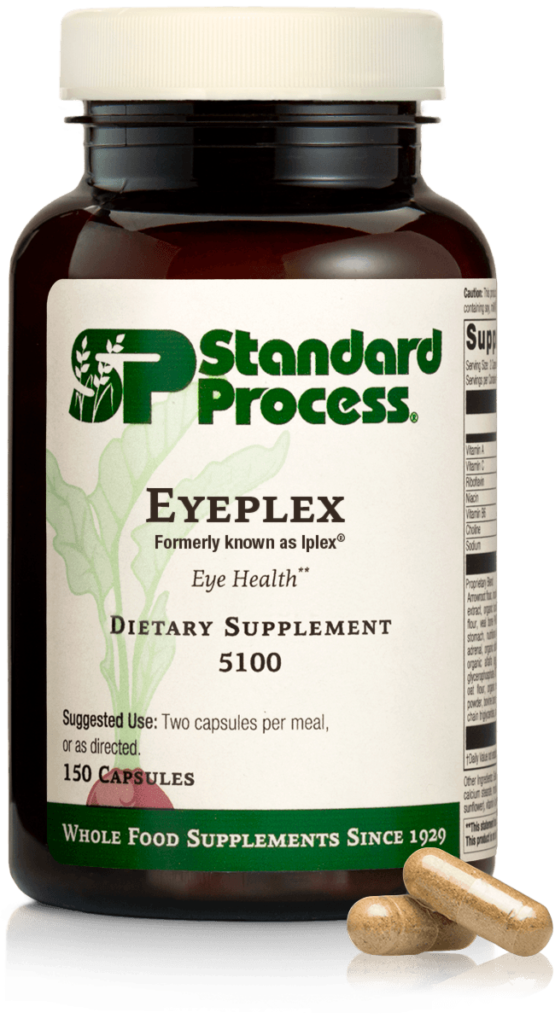
Freeze-Dried Blueberries
Freeze-dried blueberries are a powerhouse of antioxidants that can help protect your Belgian Tervuren’s eyes from oxidative stress and age-related damage. Rich in vitamins C and E, as well as anthocyanins, these tiny but mighty berries help combat free radicals that can contribute to eye diseases like cataracts and macular degeneration. Incorporating freeze-dried blueberries into your dog’s diet provides a natural and delicious way to support retinal health, reduce inflammation, and promote overall vision longevity. Plus, they’re a low-calorie, dog-friendly treat that makes a great addition to a balanced diet for long-term eye health.
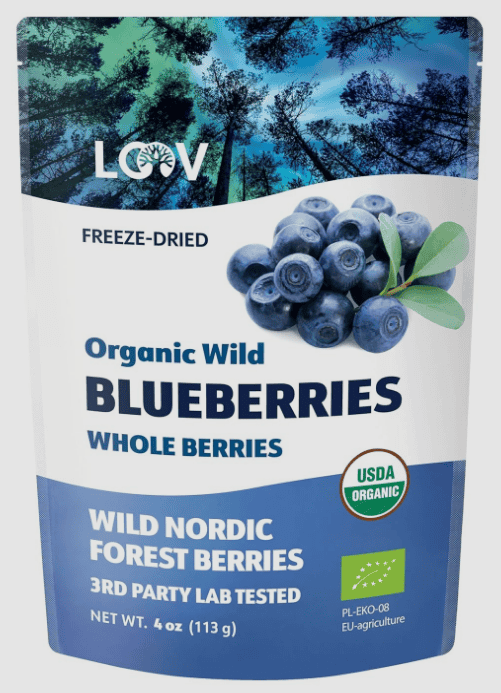
Freeze-Dried Liver
Freeze-dried liver treats are an excellent natural source of vitamin A, an essential nutrient for your Belgian Tervuren’s eye health. Vitamin A plays a crucial role in maintaining good vision, especially in low-light conditions, while also supporting overall immune function and skin health. Since liver is rich in bioavailable vitamin A, incorporating freeze-dried liver treats into your dog’s diet provides a convenient and nutritious way to promote optimal eye function. Just be sure to feed them in moderation, as excessive vitamin A can lead to toxicity. Adding these nutrient-packed treats to your pup’s routine is a simple, tasty way to support their long-term vision and well-being!
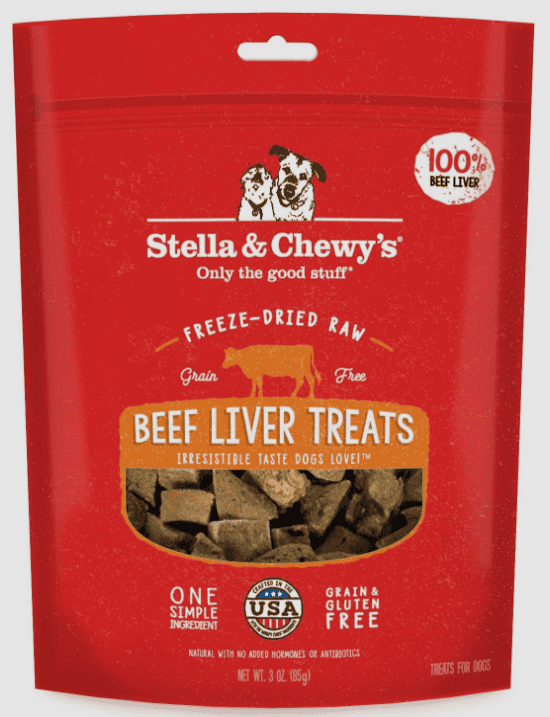
By prioritizing your Belgian Tervuren’s eye health through a balanced diet and nutritional supplements, you can help prevent many common eye issues. These simple steps can go a long way in ensuring your pup’s eyes stay healthy and clear for years to come.
Environmental Hygiene To Reduce Eye Problems
When it comes to Belgian Tervuren eye health, environmental hygiene plays a significant role. By taking some simple steps to ensure a clean and healthy environment, you can help to reduce the likelihood of your Belgian Tervuren developing eye problems.
Indoor Air Quality
Indoor air quality is a crucial factor in maintaining your Belgian Tervuren’s eye health. Dust, smoke, and other airborne particles can irritate your dog’s eyes, leading to discomfort and potentially more serious eye conditions. Consider investing in an air purifier to keep the air in your home clean and free from irritants. Regularly cleaning your home, including dusting and vacuuming, can also help to improve indoor air quality.
Be mindful of the humidity levels in your home as well. Dry air can cause dry eyes, which can lead to irritation and discomfort. A humidifier can help to maintain optimal humidity levels and keep your Belgian Tervuren’s eyes healthy.
Sprays, Diffusers, Candles, Incense
While sprays, diffusers, candles, and incense can make your home smell lovely, they can also contribute to poor air quality and cause eye irritation in your Belgian Tervuren. Many of these products contain chemicals and artificial fragrances that can be harmful to your dog’s eyes.
Instead, opt for natural alternatives like essential oils, beeswax candles, or fragrance-free products. If you do use these products, make sure to do so in a well-ventilated area and keep them out of your dog’s reach.
Remember, maintaining a clean and healthy environment is a vital part of ensuring your Belgian Tervuren’s eye health. By paying attention to indoor air quality and being mindful of the products you use in your home, you can help to prevent eye problems and keep your Belgian Tervuren’s eyes healthy and clear.
Keeping your Belgian Tervuren’s environment clean and free from irritants is just as important as providing them with a balanced diet and regular eye care. By taking these steps, you can help to ensure your Belgian Tervuren’s eyes stay healthy for many years to come.
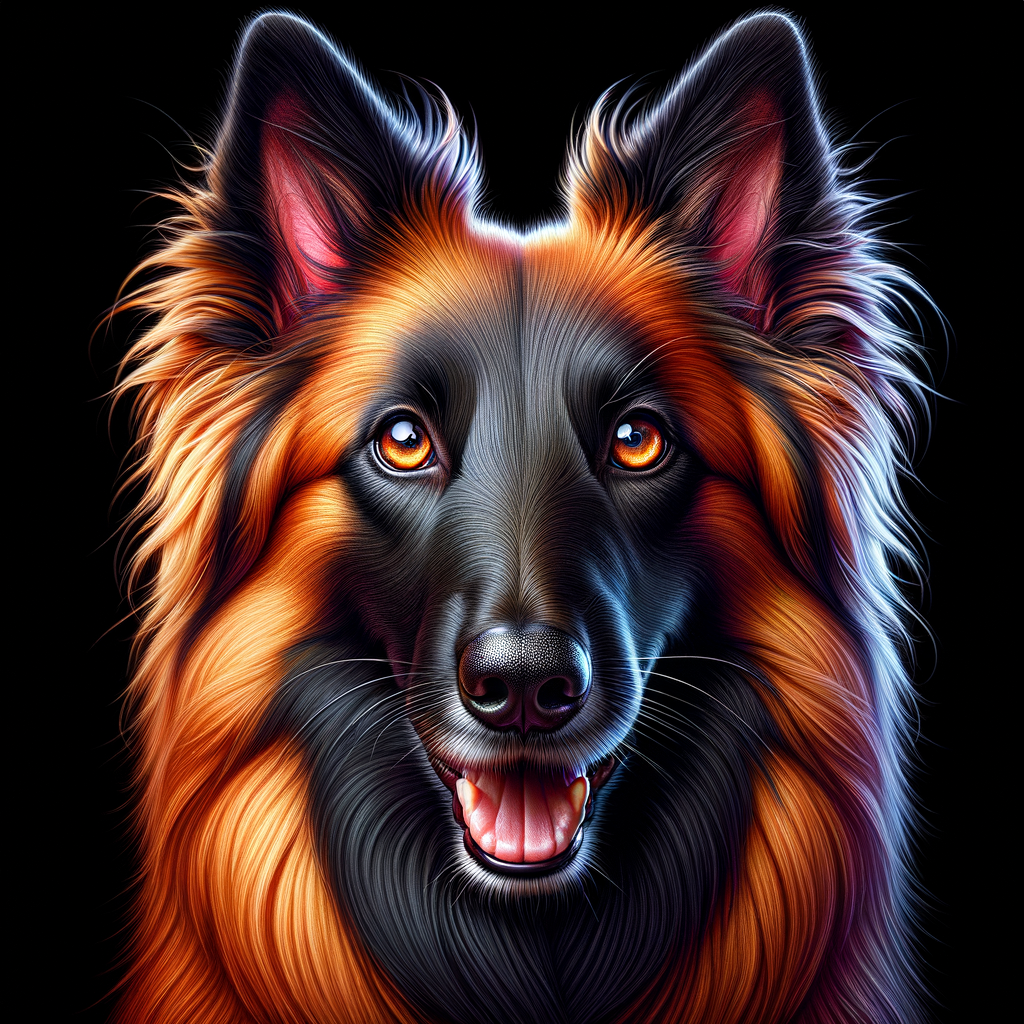
Routine Belgian Tervuren Eye Care & Maintenance
Proper Belgian Tervuren eye health requires routine care and maintenance. Your furry friend’s eyes are sensitive and require your attention to keep them healthy. Let’s look at some important steps you can take to ensure optimal eye health for your Belgian Tervuren.
Daily & Weekly Care & Maintenance
Regularly checking your dog’s eyes should be a part of your routine. Look for any signs of redness, swelling, or discharge. If you notice any of these symptoms, it may indicate an infection or other eye problem. It’s also important to clean the area around your dog’s eyes gently with a damp cloth to remove any dirt or debris that could cause irritation.
One thing to keep in mind is that Belgian Tervuren’s long hair can sometimes get into their eyes, causing discomfort or even injury. Regularly trimming the hair around their eyes can help prevent this. However, be careful not to trim too close to the eye as it can cause injury.
Additionally, it’s important to keep your dog’s eyes protected from harsh sunlight. Consider getting your dog a pair of doggie sunglasses or a hat to protect their eyes on particularly sunny days.
Monitor Hair Length, Nail Length, Bath Frequency
Monitoring the length of your Belgian Tervuren’s hair and nails is crucial for their overall health, including their eye health. Long hair can irritate the eyes, and long nails can cause scratches or injuries if your dog rubs their eyes. Regular grooming can help prevent these issues.
Furthermore, bathing frequency also plays a part in your dog’s eye health. Over-bathing can dry out your dog’s skin and eyes, while under-bathing can lead to build-up of dirt and bacteria, which can cause infections. As a general rule, most dogs need a bath about once a month, but this can vary depending on your dog’s lifestyle and breed.
To sum up, maintaining your Belgian Tervuren’s eye health involves regular check-ups, grooming, and protection from the sun. Remember, if you notice any changes in your dog’s eyes, it’s always best to consult with a vet. By taking these steps, you can help ensure your Belgian Tervuren has healthy, bright eyes for years to come.
Frequently Asked Questions
1. What are some common eye conditions that Belgian Tervurens may experience?
Belgian Tervurens may commonly experience eye conditions such as cataracts, progressive retinal atrophy (PRA), and distichiasis.
2. How can I identify if my Belgian Tervuren has an eye problem?
Watch out for symptoms like redness, excessive tearing, squinting, cloudiness, or any noticeable change in your dog’s vision. If you notice any of these signs, it is recommended to consult a veterinarian for a thorough eye examination.
3. Can eye conditions in Belgian Tervurens be treated?
Yes, many eye conditions in Belgian Tervurens can be treated or managed with appropriate veterinary care. Treatment options may include medication, surgery, or other interventions depending on the specific condition.
4. How can I prevent eye problems in my Belgian Tervuren?
Regular veterinary check-ups, maintaining good hygiene around the eyes, and avoiding exposure to potential irritants can help prevent eye problems in Belgian Tervurens. Additionally, breeding from dogs with a history of good eye health can reduce the risk of inherited eye conditions.
5. Should I be concerned about my Belgian Tervuren’s eye health as they age?
As Belgian Tervurens age, they may become more prone to developing certain eye conditions. It is important to monitor their eye health closely and seek veterinary attention if you notice any changes or concerns.
